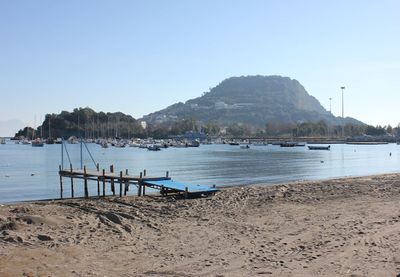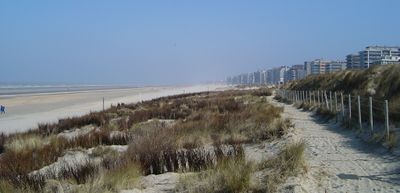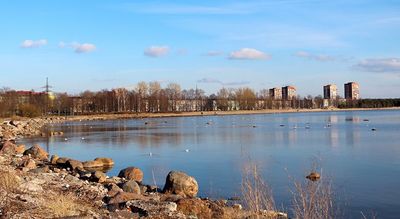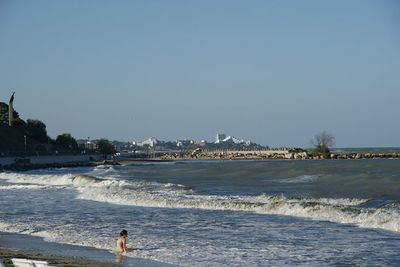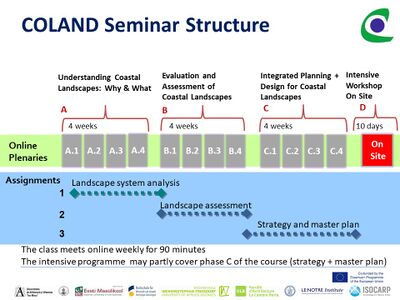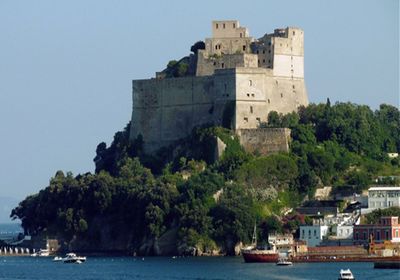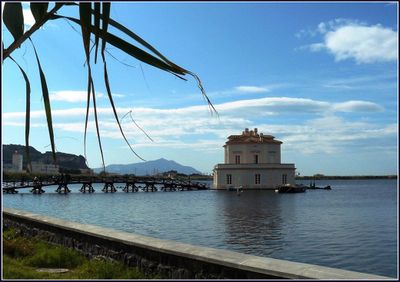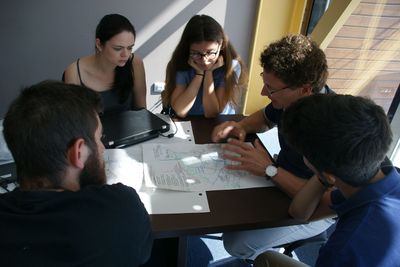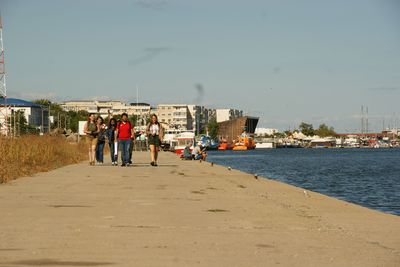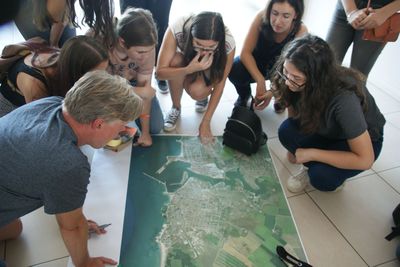Output 1 - The COLAND Online Course: Difference between revisions
No edit summary |
|||
| (22 intermediate revisions by the same user not shown) | |||
| Line 1: | Line 1: | ||
<span id="BackToTop"></span> | |||
<div class="noprint" style="background-color:#FAFAFA; position:fixed; bottom:2%; left:0.25%; padding:0; margin:0;"> | |||
[[#BackToTop|Back to the Top]] | |||
</div> | |||
[[File:Pozzuoli Naples.jpg|Pozzuoli Coast nearby Naples, photo: Antonella Cuccurullo|thumb|400px|right]] | [[File:Pozzuoli Naples.jpg|Pozzuoli Coast nearby Naples, photo: Antonella Cuccurullo|thumb|400px|right]] | ||
[[File:Key visual de panne.jpg|thumb|right|400px|View on the beach of De Panne, Belgium, photo: Didier Vancutsem]] | [[File:Key visual de panne.jpg|thumb|right|400px|View on the beach of De Panne, Belgium, photo: Didier Vancutsem]] | ||
[[File:Tallinn Kopli Beach.jpg|Kopli beach with a view to the East on the socialist block house areas, photo: Jekaterina Balicka|thumb|400px|right]] | [[File:Tallinn Kopli Beach.jpg|Kopli beach with a view to the East on the socialist block house areas, photo: Jekaterina Balicka|thumb|400px|right]] | ||
[[File:Mangalia Beach.jpg|Black Sea spa landscape in Mangalia, Romania, photo: Ellen Fetzer|thumb|400px|right]] | [[File:Mangalia Beach.jpg|Black Sea spa landscape in Mangalia, Romania, photo: Ellen Fetzer|thumb|400px|right]] | ||
[[File:COLAND Schedule General.jpg|General COLAND scheme of online and on-site learning activities|thumb|400px|right]] | |||
[[File:Pozzuoli Naples 2.jpg|Pozzuoli Coast nearby Naples, photo: Antonella Cuccurullo|thumb|400px|right]] | |||
[[File:Pozzuoli Naples 3.jpg|Pozzuoli Coast nearby Naples, photo: Antonella Cuccurullo|thumb|400px|right]] | |||
[[File:COLAND ISP Mangalia 41.jpg|Team work during the Mangalia workshop in September 2018|thumb|400px|right]] | |||
[[File:COLAND ISP Mangalia 23.jpg|Field studies on the Mangalia case|thumb|400px|right]] | |||
[[File:COLAND ISP Mangalia 24.jpg|Participatory landscape assessment with a local school class|thumb|400px|right]] | |||
[[File:Pozzuoli Naples 2.jpg|Pozzuoli Coast nearby Naples, photo: Antonella Cuccurullo|thumb|400px|right]] | |||
In the light of the sensitive nature of coastal landscapes and their relevance to society, economy and the environment it is vital that planners and designers learn how to manage these territories in a sustainable way. The COLAND project has developed a learning format that addresses this specific challenge. | In the light of the sensitive nature of coastal landscapes and their relevance to society, economy and the environment it is vital that planners and designers learn how to manage these territories in a sustainable way. The COLAND project has developed a learning format that addresses this specific challenge. | ||
| Line 43: | Line 54: | ||
== Lecture materials == | == Lecture materials == | ||
=== Phase A: Understanding Coastal Landscapes === | |||
==== A.1 Why coastal landscapes matter ==== | |||
* [https://ilias.hfwu.de/goto.php?target=sahs_20494&client_id=hfwu Session recording] | |||
* [https://ilias.hfwu.de/goto.php?target=file_25777_download&client_id=hfwu Session slides] | |||
==== A.2 Dynamics of Coastal Landscapes ==== | |||
* [https://webconf.vc.dfn.de/psfe1m37lizt Session recording] | |||
* [https://ilias.hfwu.de/goto.php?target=file_25939_download&client_id=hfwu Session slides] | |||
==== A.3 Coastal Landscapes as a Cultural Phenomenon ==== | |||
* [https://ilias.hfwu.de/goto.php?target=file_20638_download&client_id=hfwu Session slides] | |||
* [https://ilias.hfwu.de/goto.php?target=sahs_20645&client_id=hfwu Session recording] | |||
=== Phase B: Evaluation and Assessment of Coastal Landscapes === | |||
==== B.1 Integrated Landscape Assessment Approaches (1)==== | |||
*[https://ilias.hfwu.de/goto.php?target=file_20761_download&client_id=hfwu Session slides] | |||
*[https://ilias.hfwu.de/goto.php?target=sahs_20760&client_id=hfwu Session recording] | |||
==== B.2 Integrated Landscape Assessment Approaches (2) ==== | |||
* [https://ilias.hfwu.de/goto.php?target=cat_20788&client_id=hfwu Session recording and slides] | |||
==== B.3 Integrated Landscape Assessment Approaches (3) ==== | |||
* [https://ilias.hfwu.de/goto.php?target=file_26199_download&client_id=hfwu Session slides] | |||
* [https://ilias.hfwu.de/goto.php?target=cat_26197&client_id=hfwu Session recording] | |||
=== Phase C: Integrated Planning and Design for Coastal Landscapes === | |||
==== C.1 From Goal Setting to Strategy Building ==== | |||
* [https://ilias.hfwu.de/goto.php?target=file_26330_download&client_id=hfwu Lecture slides] | |||
* [https://ilias.hfwu.de/goto.php?target=cat_26329&client_id=hfwu Lecture recording] | |||
=== C.2 From Strategy to Planning and Design: Transect Method === | |||
* [https://ilias.hfwu.de/goto.php?target=file_26427_download&client_id=hfwu Lecture slides] | |||
* [https://ilias.hfwu.de/goto.php?target=mcst_26347&client_id=hfwu Lecture recording] | |||
=== C.3 From Design to Intervention: Urban Acupuncture === | |||
* [https://ilias.hfwu.de/goto.php?target=file_23394_download&client_id=hfwu Lecture slides] | |||
* [https://ilias.hfwu.de/goto.php?target=mcst_26579&client_id=hfwu Lecture recording] | |||
== Reading List == | == Reading List == | ||
Additional resources and useful readings are compiled [[Reading_List_Coastal_Landscapes|here.]] | |||
== Case Study Template == | == Case Study Template == | ||
The COLAND Case Study Template has been used as a scaffold for student teams to develop and document their own learning cases iteratively. The template follows the lectures very strictly and allows for direct application of the knowledge and methods learned during class. | |||
* The template itself can be accessed [[COLAND_Case_Study_Template_2018|here]] | |||
* Within the framework of three COLAND pilot courses, 70 cases have been documented by the various teams who participated. | |||
*You can further explore them via the respective working group pages: | |||
**[[COLAND_Online_Seminar_Working_Groups_2018|Case Studies 2018]] | |||
**[[COLAND_Online_Seminar_Working_Groups_2019|Case Studies 2019]] | |||
**[[COLAND_Online_Seminar_Working_Groups_2020|Case Studies 2020]] | |||
== Evaluation and Assessment Forms == | == Evaluation and Assessment Forms == | ||
The COLAND course includes three assessment steps. The teams provide a presentation at the end of each seminar phase. Each presentation is done according to a joint presentation template and evaluated based on a specific assessment form. We share below the templates for presentation and assessment. | |||
=== Phase A: Coastal Landscape System Analysis === | |||
* [https://ilias.hfwu.de/goto.php?target=file_22905_download&client_id=hfwu Presentation template] (PPT) | |||
* [https://ilias.hfwu.de/goto.php?target=file_31077_download&client_id=hfwu Assessment form phase 1] (Word) | |||
=== Phase B: Integrated Evaluation and Assessment of Coastal Landscapes === | |||
* [https://ilias.hfwu.de/goto.php?target=file_26131_download&client_id=hfwu Presentation template] (PPT) | |||
* [https://ilias.hfwu.de/goto.php?target=file_31078_download&client_id=hfwu Assessment form phase 2] (Word) | |||
=== Phase C: Integrated Planning and Design for Coastal Landscapes === | |||
* [https://ilias.hfwu.de/goto.php?target=file_26283_download&client_id=hfwu Presentation template] (PPT) | |||
* [https://ilias.hfwu.de/goto.php?target=file_31079_download&client_id=hfwu Assessment form phase 3] (Word) | |||
Latest revision as of 10:19, 3 December 2020
In the light of the sensitive nature of coastal landscapes and their relevance to society, economy and the environment it is vital that planners and designers learn how to manage these territories in a sustainable way. The COLAND project has developed a learning format that addresses this specific challenge.
In this section we provide all teaching and learning materials our international and interdisciplinary team has developed during this project.
Learners can use these materials for self-study. If you are teaching in a spatial planning or design programme, feel free to use them for your own teaching and/or adapt them to your needs. This section focuses on providing access to materials.
If you are interested in the didactical and organisational framework of this course, please also consider our Guidance Report and the COLAND Tool-Box.
Learning Objectives
The instructional design of the COLAND course aims at supporting the development of the following set of competences among the learners:
Subject-specific competences
...learners have an advanced understanding of:
- The specific character of coastal landscapes
- The driving forces that are influencing the landscape system
- The impact types that are most relevant for planning and design responses
- Approaches and methods for assessing coastal landscapes
- The global, European and local dimension of coastal landscapes
- Challenges to the Sustainable Development Goals
Methodical competences
...learners become able to:
- Assess coastal landscapes in a systematic and transparent way
- Translate sustainable SDGs to the local and regional situation
- Develop strategies and/or master plans for coastal landscapes
- Make well-argued plans and designs for coastal landscapes
- Present ideas and plans
Social and personal competences and attitudes
...learners experience a mindset shift towards:
- Taking the sensitive nature of coastal landscapes into account
- Taking responsibility for sustainable development
- democratic leadership
- Respecting local social values and qualities of the existing landscape
Generic learning outcomes
...learners train:
- Working in interdisciplinary and multicultural teams
- Making use of ICT for collaboration + design
- Communicating + visualising results to different audiences, including lay people
Lecture materials
Phase A: Understanding Coastal Landscapes
A.1 Why coastal landscapes matter
A.2 Dynamics of Coastal Landscapes
A.3 Coastal Landscapes as a Cultural Phenomenon
Phase B: Evaluation and Assessment of Coastal Landscapes
B.1 Integrated Landscape Assessment Approaches (1)
B.2 Integrated Landscape Assessment Approaches (2)
B.3 Integrated Landscape Assessment Approaches (3)
Phase C: Integrated Planning and Design for Coastal Landscapes
C.1 From Goal Setting to Strategy Building
C.2 From Strategy to Planning and Design: Transect Method
C.3 From Design to Intervention: Urban Acupuncture
Reading List
Additional resources and useful readings are compiled here.
Case Study Template
The COLAND Case Study Template has been used as a scaffold for student teams to develop and document their own learning cases iteratively. The template follows the lectures very strictly and allows for direct application of the knowledge and methods learned during class.
- The template itself can be accessed here
- Within the framework of three COLAND pilot courses, 70 cases have been documented by the various teams who participated.
- You can further explore them via the respective working group pages:
Evaluation and Assessment Forms
The COLAND course includes three assessment steps. The teams provide a presentation at the end of each seminar phase. Each presentation is done according to a joint presentation template and evaluated based on a specific assessment form. We share below the templates for presentation and assessment.
Phase A: Coastal Landscape System Analysis
- Presentation template (PPT)
- Assessment form phase 1 (Word)
Phase B: Integrated Evaluation and Assessment of Coastal Landscapes
- Presentation template (PPT)
- Assessment form phase 2 (Word)
Phase C: Integrated Planning and Design for Coastal Landscapes
- Presentation template (PPT)
- Assessment form phase 3 (Word)
